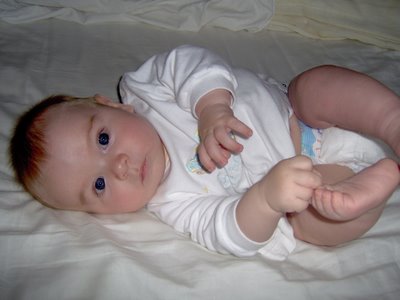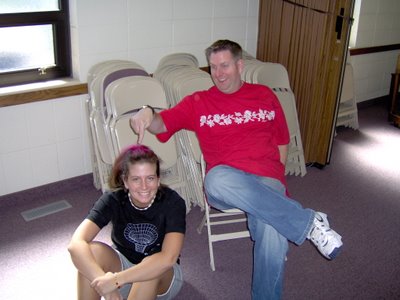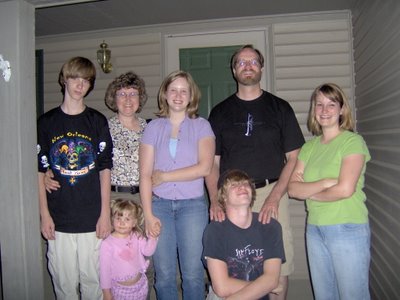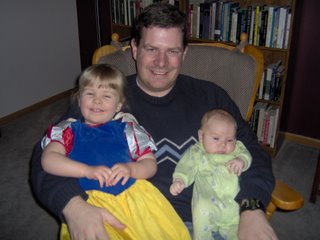A Sermon. Hilliard Ward Sacrament Meeting. March 12, 2006.
The Varieties of Revelatory Experience Bryan
Today I would like to talk about the experiences of revelation. Personal revelation is one of the pillars of Mormon belief. From the beginning, Joseph Smith seemed eager that other people swim in the same river of revelation that he was immersed in. We can ask God questions, we still believe, and he will answer. I would like to begin by telling you about four different experiences with revelation.
January 1994: Before embarking from the MTC to the mission field, a boy goes to the Provo temple wanting to know for himself if the Church is true. In response, a thought comes to his mind as clearly as if the words had been spoken aloud by somebody else. The voice asks a question that is an answer, but also a challenge. “How could it be any other way?” the voice gently asks and, by so doing, invites a life-times of continuing engagement.
November 1996: A young returned missionary, who has rarely found within himself the courage to ask anyone out, finds himself turning to young lady sitting behind him and asking her on a date. The invitation occurs at precisely the right moment; for various reasons, it was the only time when the invitation could have come and been well-received. The young man concludes he was inspired. It was less of a prompting, though, than a possession. It was as if he were acting involuntarily, as if the Spirit had somehow taken over.
May 1999: A young college graduate is deciding where to go for graduate school. Upon visiting one campus, he has a strange, negative feeling and wonders if this is the Spirit telling him not to attend that university. However, all the reasons point to that campus as the best place to go. Unsure of what to make of the negative feeling, he decides to attend that university anyway and has, it seems, a wonderful graduate school experience. He concludes that those negative feelings were probably just discomfort with the traffic running through campus.
October 2004: Now older and married, a man watches a young friend of his. His friend has been praying for some time for some sort of verification that the church is true. No recognizable answer has come. Instead of answers, there is simply silence. The prayers fly off into the nothingness of a seemingly empty universe. His friend becomes disillusioned and slowly drifts into doubt and inactivity.
These are four very different sorts of experiences with revelation. In the first experience, I was given a clear answer, but it was an answer that invited further discussion (to me, the voice gave me the answer I needed at the time, but also seemed to say, “let’s talk about this more.”) In the second experience with my future wife, it was an involuntary command rather than a quiet suggestion. This sort of revelation raises the question how such possession is possible and how is it compatible with our freedom to act? In the third experience, an impression I thought was inspiration was really no such thing, at least I don’t think it was. Perhaps the inspiration in such a moment was to ignore how I was feeling rather than following my feelings. In the fourth incident, my friend was not given a promised revelation at a crucial moment in his life – what are we to make of such moments, when the heavens seem closed to us?
These experiences show that revelation is a very complex sort of thing. I admit that it is something that I don’t understand very well. John 3:8 says that the spirit “blowest where it listeth” and we can hardly tell from “where it cometh and whither it goeth” Indeed, it sometimes seems impossible to track its movements or comprehend its wanderings. The Spirit of Revelation is more something that I watch in wonder and awe as it moves upon the souls of human beings than being something that I understand. Although I do not claim to understand what revelation is very well, however, or even how to receive it, I do think I have some ideas about what revelation is not. So I have created a list of misconceptions or myths that are common about revelation.
Myth #1. Revelation of the Spirit always comes to us in the form of feelings.
We often break the world down into two separate spheres. We have our rational life and our emotional life. We often think that our emotional life is the domain of spirituality and religion. Our capacity to reason is limited, we often say, and truth comes from following your feelings. As I missionary, I always asked how people were feeling about what I taught them, and I urged them to follow their feelings as the surest guide to truth. I now think that this probably restricts our religious lives too much. It is true that the D&C 9:8 speaks of what appear to be emotional responses to revelation (the revelation comes as a “burning in bosom” it says). But it also tells us that messages will come to our minds, our intellect, as well as our emotions (D&C 6:23 talks of the Lord speaking peace to the mind of Oliver Cowdry, D&C 6:15 talks about the Lord enlightening the mind, D&C 8:2 tells about revelation coming to our minds and hearts) .
When we look at the experience of revelation in the Scriptures, people do not always describe in terms of a purely emotional response – visions are seen, voices speak, and people have ideas that attribute to the Lord. The Spirit may prick our hearts, to be sure, as in Acts 2:37. But the Spirit also works through the whole range of human experience. Consider the many different ways that the Golden Plates were revealed to the book of Mormon witnesses – three of them were shown the Plates by an angel and heard the voice of God, eight of them were allowed to handle and examine the Plates themselves without any divine encounter. One experience was based on being passively shown the Plates and hearing supernatural testimony; the other was tactile, more actively scientific and empirical. Both experiences were certainly a type of revelation from God, but they were very different sorts of experiences. There are many ways God may reveal his will to us: we may feel emotions, it appears, but we many also be given ideas and reasons as we actively try to figure stuff out. As I will discuss more in the end, we should be open to the many ways God speaks. In fact, remembering revelation as coming to both mind and heart is important because if we look to our feelings alone, it is hard to distinguish prejudice from promptings, or indigestion from inspiration.
Myth #2. There is always one right answer to life’s questions, and revelation will help us to find that one right answer.
The scriptures present us with several moments when there seems to be an open exchange of ideas between human beings and their Heavenly Father. In Genesis 18, we have Abraham bargaining with the Lord about the fate of Sodom. We Genesis 19:19 we find Lot bargaining with the Lord about where he will flee once Sodom is destroyed. In the Book of Ether, we have the brother of Jared proposing an idea to the Lord about how to provide light in his barges. In such moments, it seems as if the “right answer” is not fixed in God’s mind. The right answer does not sit there awaiting us to discover it. It seems that, as least some of the time, what constitutes the “right answer” about what we should do is cooperatively shaped as God listens to our ideas and brings us into the process of formulating action. God wants us, as it says in D&C 9:8 to study it out in our minds, to try to figure an answer for ourselves, and then he will guide us (“let’s see what you’ve got,” he seems to say). In this way, God makes us a part of his creative and redemptive work.
It is important to note that this cooperative work with God did not only happen in ancient times. The process by which Joseph Smith constructed the D&C is instructive on this point. In his wonderful recent biography of Joseph Smith, Richard M. Bushman writes:
The editing process uncovered Joseph [unique] assumptions about the nature of revealed words. He never considered the wording infallible. God’s language stood in an indefinite relationship to the human language coming through the prophet….Recognizing the pliabily of the revealed words, Joseph freely edited the revelations by the spirit, making emendations with each new edition. He thought of his revelations as imprinted on his mind, not graven in stone. With each edition, he patched pieces together and altered the wordings to clarify meaning. They words were both his and God’s. (2005, p. 174)
In other words, the revelations in the D&C were co-constructions of God working through the mind of the prophet Joseph; they were not words graven in rock. I believe revelation is often like this, although I don’t know how much it is like this or when we can know when we should think of ourselves as co-participants in constructing the answers we get. It is an idea, though, that I find endlessly exciting.
Myth #3. Revelation is always personal.
When we use words “personal revelation” we tend to imply that revelation is a simple transaction between an individual and God. This ignores, however, the social aspect of revelation. Sometimes God answers us through the actions of others; sometimes the revelation comes not to any individual alone but to a group. For our most important revelations – like a Patriarchal blessing – God has arranged things so the revelation does not come to us personally and we are forced to rely on somebody else to help us. Sometimes it seems that one person has one piece of revelation, and somebody else has another piece. As we come together in discussion, the whole picture emerges. Richard Bushman writes about how Joseph Smith saw the work of church councils to be an important conduit of revleation:
After the organization of the Twelve apostles, the frequency of canonical revelations dropped precipitously. The commandments to particular people, included among the revelations in the early years, were omitted from later compilations. Instead, Joseph’s history was filled with the minutes of the Twelve Apostle’ meetings as if they had become the source of inspiration. The Acts of the Apostles from the New Testament -- a history of their activities – became the pattern for revelation rather than the visions of Moses on Sinai. …By putting the work of councils on the same plan as his own revelations, Joseph set a precedent for inspiration other than his own: revelation through a council.
In the case of a council, revelation is given to the group and not only to one person individually. We should not, therefore, let the idea of personal revelation blind us to the existence of revelation as a community phenomenon.
Myth #4 Everyone Experiences Revelation In Similar Ways
When we hear testimonies in Church, or when we read the scriptures, it sometimes seems that revelation should be an easy thing. Moroni 10 gives us a simple method to use to receive revelation about the Book of Mormon. For some people, it does seem to be easy as following a simple method. Such people speak of manifestations coming like a river barely contained by its banks. Joseph Smith, again, was one such person for whom the heavenly world was as constantly near as our world. For others, though, revelation is less like a continually flowing stream and more like a slowly dripping well in a thirsty desert. Such people cling to those drops of revelation that have seemed like clear manifestations of God’s guidance and love, and listen intently, hoping such manifestations come again soon. I sometimes feel like this is how it is with me. For others, clear divine manifestations don’t seem to come at all, such as the friend in my experience. Why God gives us such different experiences with revelation, I can’t say. But I don’t think it can always be attributed to lacking worthiness or sincerity. Nor do I think it is because they refuse to recognize an answer. After all, at the end of his life, even Christ on the cross felt forsaken by his Father and painfully understood what heavenly silence was like when he cried Eli , Eli lama Sabacthani (Matt 27:46). Perhaps for us, like Alma 7:12 says of Christ, there is something specific that we are to learn in those moments when the heavens are closed to us, something we are to learn about how we can best succor other people according to their infirmities. Maybe we are to learn how to help those who wander without God’s guidance, for example.
Another possibility is that, in such moments, we are forced to listen more closely to the many ways God can speak to his children and through his children. Perhaps our revelation is to come through involvement in art, music, or science. Perhaps it is to come through family testimonies that we are to learn to trust. Perhaps our revelation can come in the eyes of a child, or in the tears of a child, or in the embrace of the child. Perhaps our revelation is in the warm story of a grandparent or in the coldness of their skin on the day that they die. Perhaps it is in the forest in the summer twilight or in a book that opened our eyes – where once we were blind, we now see. Perhaps revelation is in memory – a memory of our mother’s knee or of an opportunity that we once squandered. Perhaps it is in finding a community to be a part of, or a community that is calling for our help. Perhaps.
March 2004: A young father is worried about his relationship with his infant daughter, who has clearly become a Mommy’s girl. That night he prays that he daughter can somehow feel how much he loves her. The next morning, his daughter awakes and asks, for the first time, for Daddy. The words of a song come to his mind: “When I walk through the shades of death, thy presence is my stay, One word from thy supporting breath, drives all my fears away.”
It is a myth that revelation will come to everybody in predictable ways, but it is not a myth that heavenly Father loves us and lovingly speaks in a thousand different languages of love. It is my prayer that we may have ears to hear this language.







































